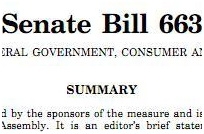Advertisement
Oregon Small Business Protection Committee Bill Could Eliminate Non-Servicing Mortgage Lenders

The Oregon Legislature has announced the introduction of Senate Bill 663 (SB 663), which prohibits, for a period of five years after the closing date for a mortgage loan, the sale, assignment, conveyance or transfer of the loan or right or obligation to service the loan. The bill was sponsored by the Oregon Senate Committee on General Government, Consumer and Small Business Protection.
SB 663 effectively stops the flow of securitization and or servicing of closed loans. Albeit, concerns raised regarding the transfers being done without the proper disclosure have been brought to light on a national scope of late with the robo-signing controversy, SB 663 could potentially limit consumer access to financing when lenders unable to move their portfolios and replenish their warehouse lines withdraw from the Oregon marketplace.
"The verbiage in this bill would remove any and all lenders from offering consumers mortgage financing in the state of Oregon," said Andy W. Harris, CRMS, president of the Oregon Association of Mortgage Professionals (OAMP), the state affiliate of the National Association of Mortgage Brokers (NAMB) that will be lobbying against the passage of SB 663. "This bill would devastate our Oregon economy, housing, consumers and small business as you can imagine. With the banks continuing to monopolize and the consumers best interests at stake, it’s more imperative now than ever that we support local small business and the protection of fair price competition and accountability for our consumers."
SB 663 applies to a mortgage loan or mortgage banking loan that a mortgage banker, mortgage broker or mortgage loan originator makes on or after the date becomes enacted if passed.
"SB 663 could force the few remaining small- and medium-sized mortgage banking and broker businesses who offer good, high-quality mortgage services to homeowners and real estate professionals alike, to lay off staff or close their doors," said Chris Barry, senior loan officer with Allied Home Mortgage Corporation. "This, in turn, would increase the unemployment figures in Oregon and create yet another obstacle to Oregon’s economic recovery. The health of our housing industry is a pillar to overall economic vitality. State tax revenue derived from a healthy housing sector would suffer further as a result of passage."
About the author





